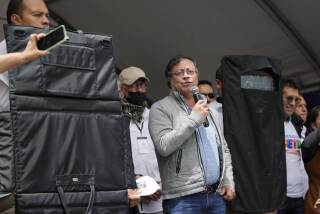Accused of Crimes, Colombia President Woos the Poor
- Share via
BOGOTA, Colombia — While Congress reopens an investigation that could lead to his impeachment, President Ernesto Samper is traveling the nation and handing out huge sums of government money. He is using pork-barrel politics to shore up his support among the poor because the facts condemn him, critics contend.
Prosecutor General Alfonso Valdivieso on Wednesday presented a congressional committee with testimony and documents that he said prove Samper committed four crimes stemming from the Cali drug cartel’s contribution of millions of dollars to his 1994 electoral campaign. The panel had dropped an earlier investigation of the president in December, citing lack of evidence.
He accused Samper of illicit enrichment, violations of the electoral law, falsification of documents and a cover-up. Three Cabinet ministers who were campaign officials are also implicated.
As evidence against him mounts, critics say, the president is trying to muster the support of the poor by claiming that the rich want to destroy his presidency in order to destroy his anti-poverty programs.
“Samper is trying to create the impression that his problems are a plot by the rich and the gringos against a president who defends the poor and cares about social problems,” said Enrique Santos Calderon, deputy editor of the Bogota newspaper El Tiempo.
At rallies such as one earlier this month in Barranquilla on the Caribbean coast, where he handed out $61 million to local anti-poverty programs and public services, Samper has been promising the poor who voted for him that he will not abandon them.
“I have not spent a single minute of the government’s time in resolving personal problems,” he told thousands of people who attended the rally. “On the contrary, I have redoubled my effort so that the social program that the voters chose will continue.”
Congressional sources said local officials used government anti-poverty funds to organize the pro-Samper demonstration.
Samper’s populist giveaways--including jobs and pet projects for congressional representatives who would vote on whether to impeach him--so outraged the deputy comptroller general, Miguel Gomez, that he resigned last week in protest.
“Government jobs and money are being handed out en masse with the sole purpose of protecting this government and ensuring that it survives,” Gomez said. “What this government is doing with public funds constitutes an immorality never before seen in Colombia.”
In the month since Samper’s campaign manager, Fernando Botero, recanted earlier statements and said the president knew about contributions from drug lords, several ambassadors and Cabinet members have resigned, students have marched through the streets in protest, and 15 important economic associations have called for the president to step aside temporarily. That call was echoed this week by Colombia’s loyal opposition Conservative Party and the president of the Colombian Bishops Conference.
Nevertheless, Samper’s strategy appears to be working. On his frequent trips across the country, thousands of slum dwellers, laborers and peasants turn out to greet him and ask for money. Few people in the nation’s poorest regions seem to care that the president is accused of being in the Cali cartel’s pocket.
“I voted for Samper, I trust him and I think he is the best president we have ever had because of all the help he has given us,” said Hernando Puerto, a 56-year-old house painter from a lower-middle-class neighborhood in Bogota, the capital.
Analysts acknowledge that in this nation, where nearly half the population lives in poverty, it is mostly people in the middle and upper classes who are outraged about drug corruption.
“Many poor Colombians don’t care if their politicians are tainted with drug money,” said Maria Victoria Uribe, director of the Colombian Institute of Anthropology. “They care that politicians fulfill their promises about jobs and government aid.”
More to Read
Sign up for Essential California
The most important California stories and recommendations in your inbox every morning.
You may occasionally receive promotional content from the Los Angeles Times.












